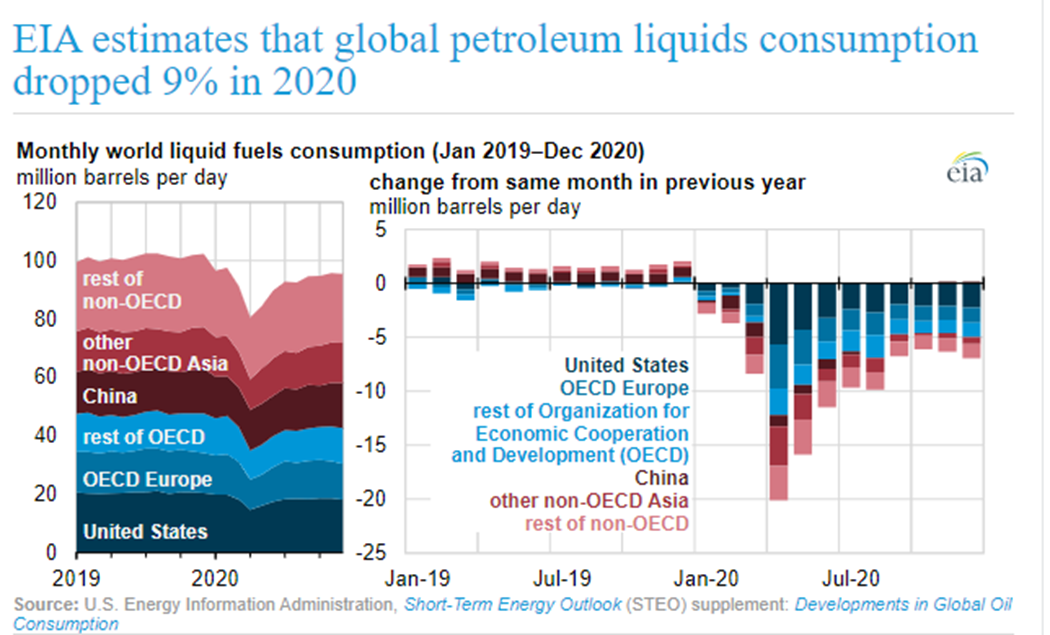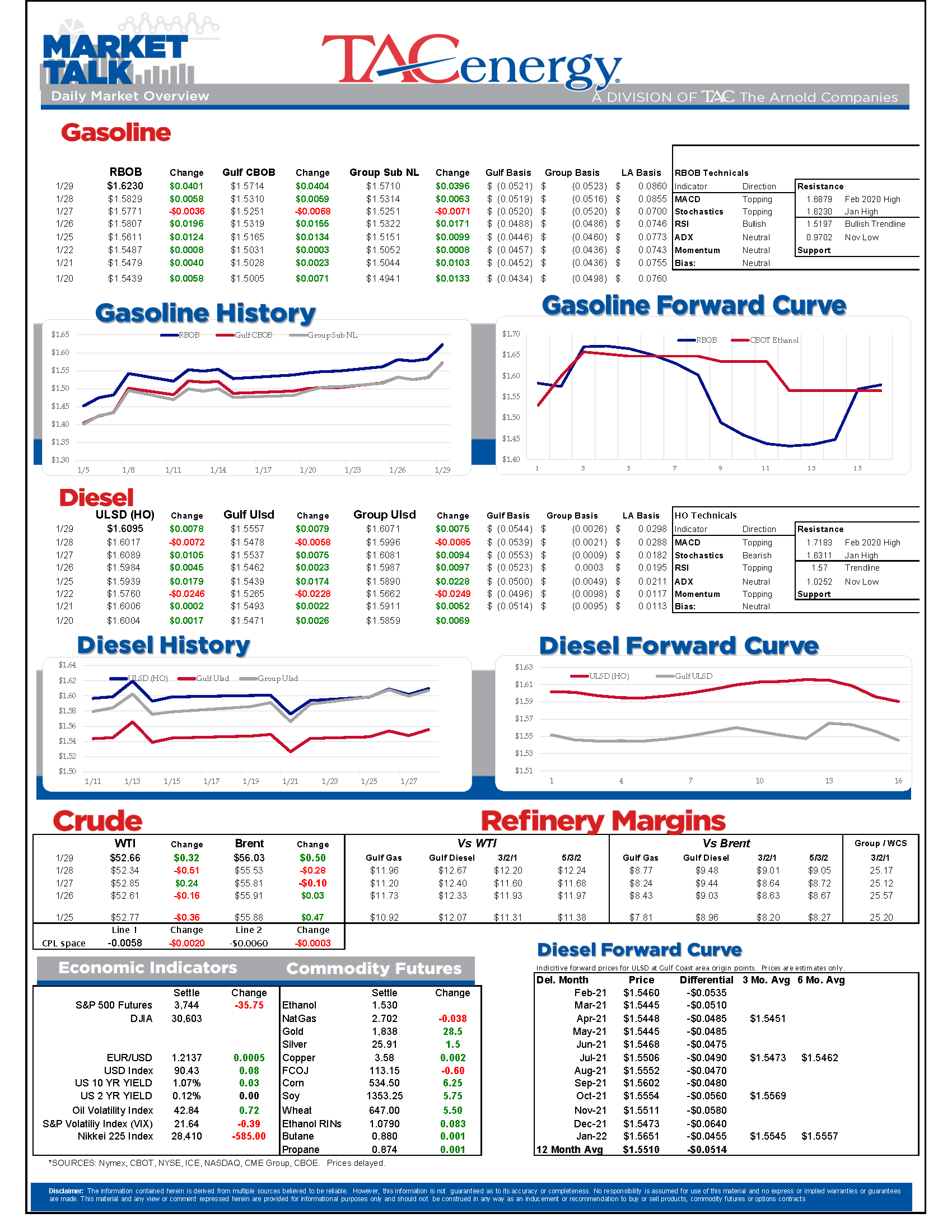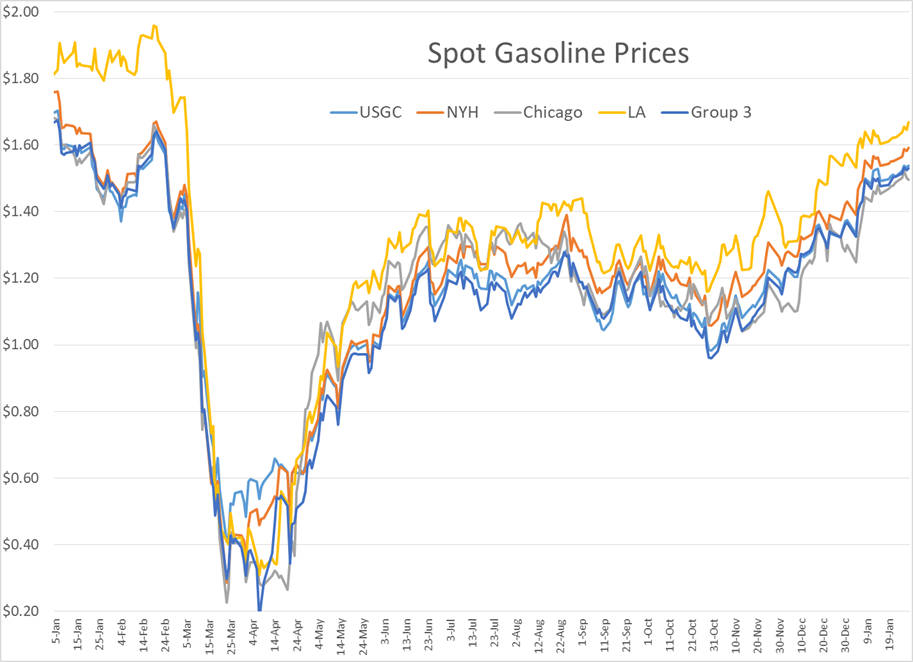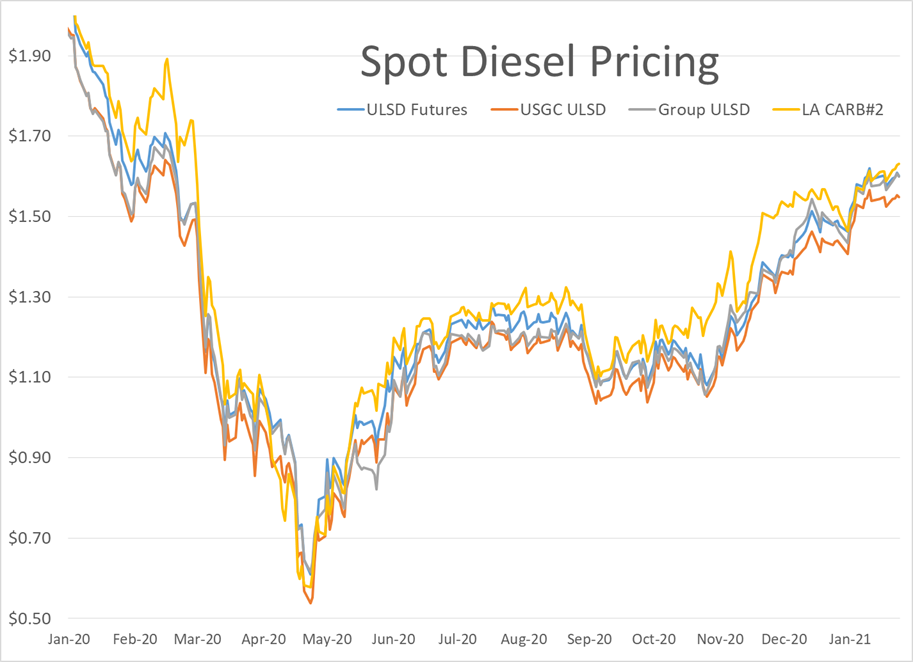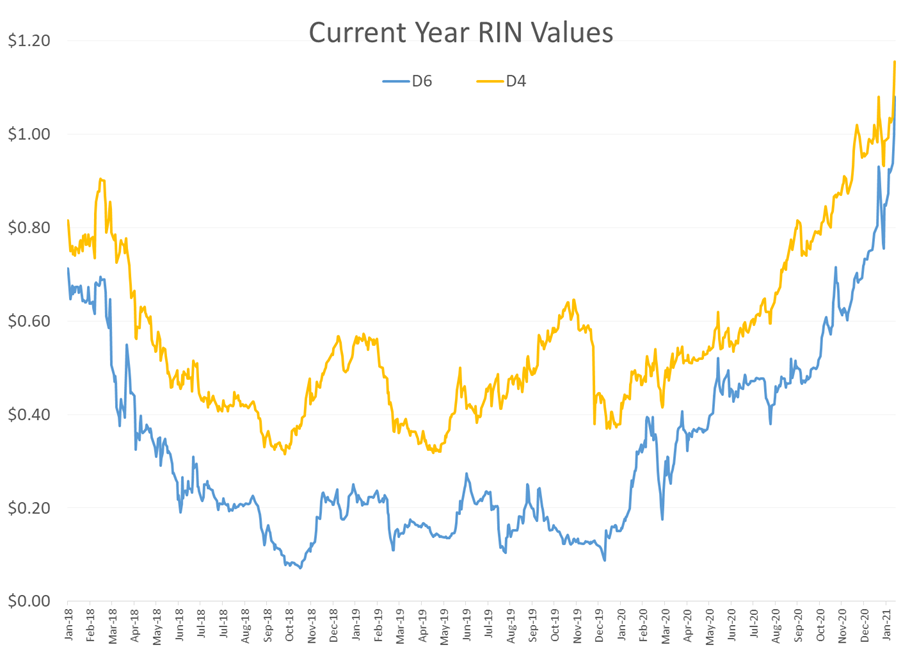Moves In Energy Futures Remain Relatively Muted

January trading is winding down with gasoline trying to lead the energy complex on another rally, while oil prices are resisting the pull higher. Both ULSD and RBOB futures are hovering near 11 month highs, with buyers pushing up crack spreads that are struggling to keep pace with surging RIN values that are threatening to be the straw that breaks the backs of some refiners struggling through the COVID demand destruction.
The moves in energy futures remain relatively muted, even as equity markets around the world are seeing a sharp increase in volatility this week.
Electric cars are all over the news this week after the President announced a plan to overhaul the federal fleet with electric vehicles, which caught many – who anticipated a push towards renewable fuels – off-guard. A Reuters report yesterday suggests that big oil lobbyists are reaching out to big ag in Washington to try and come up with a way to fight that plan. Meanwhile, GM announced plans to completely phase out internal combustion engine powered vehicles by 2035, joining California’s governor in the lofty electric vehicle goals that will be powered by _________ (they haven’t got that far yet). A recent study by California’s energy commission suggests to accomplish the goal, the state alone will need 1.5 million electric charging stations in the next 10 years, while the President’s plan lays out just 500,000 for the entire country.
Valero’s Q4 earnings release shed more light on the challenging operating environment for refiners. The company’s refining segment reported an operating loss of $476 million (excluding LIFO adjustments) during the quarter, compared to $1.4 billion in income during Q4 2019. The company’s renewable diesel and ethanol segments were profitable during the quarter, but also saw reduced earnings compared to the prior year. Perhaps most notable in the release is that Valero, via its Diamond Green joint venture, is planning to quadruple its renewable diesel production in the next couple of years with an expansion of their existing facility in St. Charles, and with a new plant at Valero’s Port Arthur refinery.
The EIA this morning published a closer look at the global demand destruction in Petroleum products last year, which shattered all records for the 40 some years the agency has been tracking this data.
Click here to download a PDF of today's TACenergy Market Talk.
Latest Posts
Week 15 - US DOE Inventory Recap
Prices To Lease Space On Colonial’s Main Gasoline Line Continue To Rally This Week
Equity Markets Have Been Pulling Back Sharply In Recent Days As Inflation And Trade Concerns Inject A Sense Of Reality Into Stocks
Gasoline And Crude Oil Prices Reached Fresh Multi-Month Highs Friday Morning As News Of The Anticipated Attacks Spread
Social Media
News & Views
View All
Week 15 - US DOE Inventory Recap

Prices To Lease Space On Colonial’s Main Gasoline Line Continue To Rally This Week
Energy markets are sliding lower again to start Wednesday’s trading as demand concerns and weaker stock markets around the world seem to be outweighing any supply concerns for the time being.
Rumors continue to swirl about an “imminent” response by Israel to Iran’s attacks, but so far, no news seems to be taken as good news in the hopes that further escalation can be avoided, even as tensions near the Red Sea and Strait of Hormuz continue to simmer.
Prices to lease space on Colonial’s main gasoline line continue to rally this week, trading north of 11 cents/gallon as Gulf Coast producers still struggle to find outlets for their production, despite a healthy export market. Gulf Coast CBOB is trading at discounts of around 34 cents to futures, while Gulf Coast RBOB is trading around a 16-cent discount, which gives shippers room to pay up for the linespace and still deliver into the East Coast markets at a profit.
Back to reality, or just the start of more volatility? California CARBOB basis values have dropped back to “only” 40 cent premiums to RBOB futures this week, as multiple flaring events at California refineries don’t appear to have impacted supply. The state has been an island for fuel supplies for many years as its boutique grades prevent imports from neighboring states, and now add the conversion of the P66 Rodeo refinery to renewable diesel production and the pending changes to try and cap refinery profits, and it’s easier to understand why these markets are increasingly vulnerable to supply shocks and price spikes on gasoline.
RIN prices continue to fall this week, touching 44 cents/RIN for D4 and D6 values Tuesday, their lowest level in 6 weeks and just about a nickel above a 4-year low. While the sharp drop in RIN and LCFS values has caused several biodiesel and Renewable Diesel producers to either shut down or limit production, the growth in RIN generation continues thanks to projects like the Rodeo refinery conversion, making the supply in RINs still outpace the demand set by the Renewable Fuel Standard by a wide margin.
The API reported draws in refined products, 2.5 million barrels for gasoline and 427,000 barrels for distillates, while crude oil stocks had an estimated build of more than 4 million barrels. The DOE’s weekly report is due out at its normal time this morning.
Click here to download a PDF of today's TACenergy Market Talk.

Equity Markets Have Been Pulling Back Sharply In Recent Days As Inflation And Trade Concerns Inject A Sense Of Reality Into Stocks
It’s a mixed bag for energy markets to start Tuesday’s session with gasoline prices holding small gains, while oil and diesel prices show small losses as the world anxiously debates what comes next in the conflict, we’re still hoping we don’t have to call a war in the Middle East.
An early sell-off picked up steam Monday morning with refined products down more than a nickel for a few minutes, before reports that Israel was vowing to respond to Iran’s attack seemed to encourage buyers step back in an erase most of the losses for the day.
Equity markets have been pulling back sharply in recent days as inflation and trade concerns inject a sense of reality into stocks that had been flying high earlier in the year. The correlation between gasoline and crude oil prices had been fairly strong for the past couple of months but has since weakened as the weakness in stocks hasn’t yet trickled over into the energy arena. Both asset classes are seeing a tick higher in their volatility (aka Fear) indices this week however, and when fear starts driving the trade, we often see these prices move together.
Diesel has been underperforming the rest of the energy complex for most of the year so far, and those hoping for lower diesel prices got more good news when the Dangote refinery in Nigeria began loading diesel for domestic use Monday, in the latest milestone for the giant project that will have a major influence on Atlantic basin supply. Naturally, local lawmakers are already complaining that the refinery’s prices are too high.
The EIA this morning highlighted the record amount of crude oil China imported in 2023 after reopening the country post-COVID and after completing numerous new refinery builds in the past few years. Russia accounted for the largest increase in shipments to China last year, as China is one of the few countries that doesn’t mind ignoring sanctions. Speaking of which, the US House is expected to take up a new vote this week on sanctioning Chinese imports of Iranian crude, which the EIA notes are often hidden by relabeling the crude to make it appear as if it originated in Malaysia, Oman or the UAE.
We’re just 2 weeks away from the startup of Canada’s long-awaited Transmountain pipeline expansion that will bring roughly 600,000 barrels/day of capacity to the Pacific basin. That new outlet is great news for Canadian producers long restricted by takeaway capacity, and bad news for Midcontinent refiners who have grown accustomed to the discounted Canadian grades. A Bloomberg article Monday noted that Iraq’s Basrah Heavy crude is most likely to be displaced by West Coast US refiners who can now buy much closer to home.
Click here to download a PDF of today's TACenergy Market Talk.
